
Plea for a European Renaissance from Below
Founders of Herr & Speer, Berlin
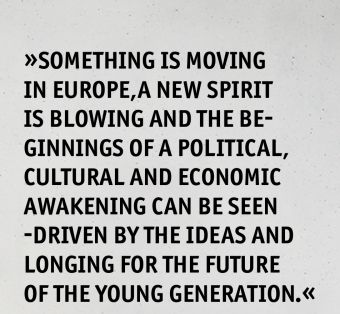
Plea for a European Renaissance from Below
Anyone looking at Europe today sees a continent struggling for its future. We have no doubt that the EU is no longer a stable house: Nationalist and populist movements are undermining Europe’s democracy, civil liberties and the rule of law are in danger, and many citizens‘ fears of decline and worries about the future are real. Instead of 28 states, there are now only 27 united under the umbrella of the European Union. And hanging over everything is the sword of Damocles of the climate crisis with its existential threat to future generations and to our fellow creatures. These and many other concerns are not easy to address and are even more difficult to solve.
But if you look at Europe today, you see not only shadows but also a lot of light. We see developments that give us courage and optimism. Civil society is resisting cuts to the rule of law, tens of thousands of young people are taking to the streets in support of better climate policy, and a new generation of politicians is taking up positions in parliaments and city councils with pro-European ideas and concrete commitment. At the same time, European entrepreneurs and cultural workers are developing solutions and offers that combine economy and socio-ecological responsibility, culture and politics. And all of this is increasingly happening across borders. Something is moving in Europe, a new spirit is blowing and the beginnings of a political, cultural and economic awakening can be seen—driven by the ideas and longing for the future of the young generation.
Rediscovering the Revolutionary Spirit of European Unification
In order for this tender seedling of European awakening, creativity, entrepreneurial spirit, political responsibility and the common good to develop, Europe will need the courage to try something new. Inspiration for this can also be found in the past. The European unification project itself shows with its development steps, which reconciled states and people and gave room to new ideas and methods, how it can be done. This spirit must be rediscovered, just as in the Renaissance, when people rediscovered what was once possible.
If we look at the history of European unification, it is nothing less than a revolution and one of the most successful ventures in history. European unification with its various stages of development—the Coal and Steel Community, the European Economic Community, the European Community up to today’s EU—has fundamentally changed the dynamics of European politics and its modus operandi from what was the continental custom for centuries: rivalry and war.
The result: never has there been a longer period of peace on the continent, never has economic and social progress been so comprehensive. Today, despite all the challenges, the EU is one of the most peaceful regions in the world, as the Global Peace Index shows. This idea would hardly have been conceivable in 1918 or 1945, or even between 1618 and 1871. In terms of peace, the revolution delivered what it promised. This was also due to the fact that this European Revolution was one of a special kind. Unlike many other revolutions with disruptive violent outbursts, political radicalisation and hasty throws, European unification was a process of careful steps, not too big, but mostly consistent.
Against the background of decades of enmity, especially between Germany and France who were central figures in the European project from the beginning, this mode is not surprising. But it has also been astonishingly successful. Traditional and nationally focused politics were not broken up and overthrown in one fell swoop, but reformed in small bites and introduced to a new Europe of cross-border cooperation. This was also due to the courage to come up with new and unusual ideas and proposals.
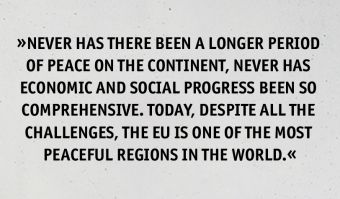
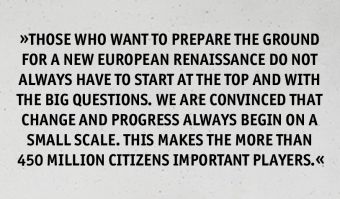
Ideas are the fuel
The EU embodies the courage to give new ideas a space and a chance, even and especially when the deceptive promise of settling down and staying put is at its greatest. This special spirit that can blow when we dare to do something new is described by Gerhard Brunn when the new Commission President Jacques Delors took office in 1985: „From the very first moment, he instilled new self-confidence into the demoralised, disoriented Commission and, with a handful of brilliant staff and a fireworks display of ideas, got it moving in such a way that some people lost their hearing and sight.“ Even if all these ideas (from Delors and many others) were not always implemented immediately, they often came to fruition via detours, and sometimes years later. Whether in the case of the common currency, the dismantling of border controls or a common security policy, a moment has always been found to take a further step toward integration.
In this way, revolutionary things were created through a gradual but constant evolution of political ideas. We call this modus operandi of the European Union and its predecessor organisations the European revolution of small steps. We think it is time to recall this revolutionary spirit, to revive it and to activate it, specifically for the future. While grand and long-term visions and castles of thought are important and can be beacons for the future, the immediate future of Europe is in the hands of those who understand and walk the fine line between too little and too much.
The EU thrives on constant development and movement forward. So pausing is not an option. At the same time, the history of European unification teaches us that taking too big a leap or doing too much in one fell swoop can be equally damaging and counterproductive. The United States of Europe, the European Federation or the European Republic may be inspiring goals, but the way to get there is through concrete, bold and feasible steps that directly and positively improve life in the EU.
Those who want to prepare the ground for a new European Renaissance do not always have to start at the top and with the big questions. We are convinced that change and progress always begin on a small scale. This makes the more than 450 million citizens important players. They help decide the direction in which Europe is heading. But far too often, obstacles are placed in the way of their ideas and their drive, or they are unable to realise their potential for financial reasons. If you want to think about the future, you have to be able to afford it. We have a proposal to change that and give more people the opportunity to drive social, cultural and economic innovation.
A start-up booster for all Europeans as a seedbed for innovation and progress
Europe is not a continent with a strong culture of entrepreneurship or innovation. This is particularly noticeable for young, creative and creative people with ideas. Anyone with an idea for a social innovation, an art project or a company is often confronted with skepticism, risk aversion and complicated access to financial support. Culturally and structurally, the European region tends to be geared more toward security and stability and less toward risk-taking and the ability to change. Anyone in the EU who has run a start-up into the ground or failed with a political idea or an ambitious art project rarely receives recognition or is encouraged to try again. Avoiding mistakes is more important than learning from them.
The European start-up scene is also underfunded. Nearly half of young European companies receive the all-important initial investment from outside the EU. „European investors are cautious and skeptical and want to see sales before they invest,“ writes journalist Grace Brennan. All of this puts the brakes on innovation. It’s no surprise, then, that in the top 10 rankings of the world’s most startup-friendly countries, with the exception of Germany in second place, EU states find themselves at the bottom of the list, in this order: Poland, Spain, Sweden and France. How many good ideas, groundbreaking works of art, smart products or innovative political approaches do not therefore see the light of day?
5,000 euros for all young people as a nationwide start-up booster
If Europe wants to put wind under the wings of the next generation with their ideas and see innovations take off, something has to change. While it takes time and perseverance to evolve cultural behaviours and thought patterns, it is possible to make direct changes in terms of funding and framework conditions.
We propose that every young person in the EU between the ages of 20 and 30 should have access to a so-called European innovation start-up credit. A minimum sum of 5,000 euros should be accessible to all those who want to start their own business with an entrepreneurial idea or a social, cultural or political innovation, or who want to continue their professional training. The sum would be provided by the EU budget from EU taxes and distributed by national and regional employment agencies and offices. Young people could register there or online with their business idea or educational project and thus receive their start-up credit with as little bureaucracy as possible. After a brief check, the funding amount of 5,000 euros would then transferred to the business account or directly to the respective educational institution. A one-time higher funding sum of up to 30,000 euros would also be possible if a convincing concept were presented and appropriate follow-up documentation ensured.
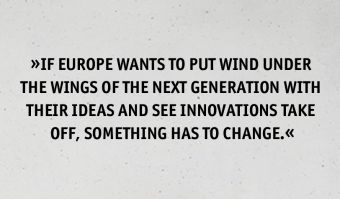
The start-up credit would pay particular attention to an aspect that is often neglected in the discussion about start-ups and innovations: the connection between a successful start-up and the socio-economic background of the founders.
Unfortunately, it is still disproportionately men who found companies. Around 93 percent of tech funding goes to all-male teams.1 So it’s not so much the individual’s dedication, sincerity or courage that determines entrepreneurial success in the early hours, but their financial and social background and gender.2
Those with a safety net can take greater risks. Those who are hyper-masculine take success home with them. The EU must counter this Anglo-Saxon and male-dominated logic and culture with something of its own and respond with an egalitarian, decentralised and diversity-oriented instrument. A European innovation starter credit will change hundreds of thousands of lives and make ideas fly in Europe.
Europe Bottom-Up as an Opportunity
What can happen when millions of people are given the opportunities to test or even implement their ideas and creativity can only be imagined. We are firmly convinced: Europe still has its best days ahead of it if we remember our strengths and values, carefully nurture our curiosity and ability to learn, and empower more people to be part of the path of progress. We, the citizens of Europe, have all the qualities and skills needed for this European path, this new European Renaissance.
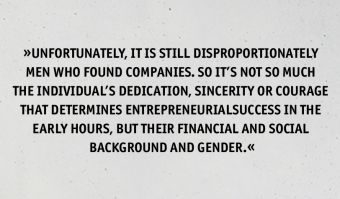
Sources
1 Elizabeth Schulze, »93 % of funding for European tech start-ups goes to all male teams, new report finds«,
CNBC, 07.12.2018, https://www.cnbc.com/2018/12/07/ metoo-in-europe-93percent-of-tech-funding-goes-to-all-male-founders.html
2 Aimee Groth, »Entrepreneurs don’t have a special gene for risk – they come from families with money«,
Quartz, 17.07.2015, https://qz.com/455109/entrepreneurs- dont-have-a-special-gene-for-risk-they-come-from-families-with-money/
Vincent-Immanuel Herr & Martin Speer
Vincent-Immanuel Herr and Martin Speer are authors, speakers and consultants from Berlin. They are initiators of the EU mobility program DiscoverEU and are committed to a united Europe and gender equality. Their latest book „Europe For Future – 95 Theses that Save Europe“ was published by Droemer in 2021.
More info: www.herrundspeer.eu
Picture: © Phil Dera

